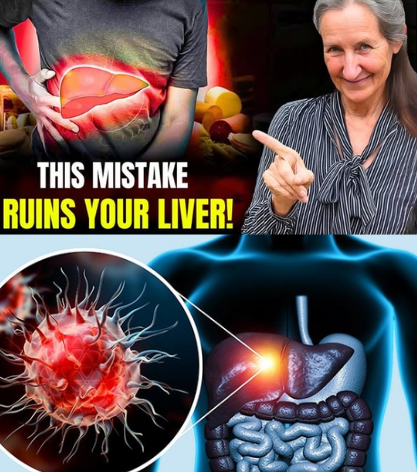
When it comes to managing the complex operations of the human body, the liver is the ultimate multitasking boss. Think of it as your body’s project manager, coordinating, regulating, and streamlining countless processes behind the scenes—ensuring that every system runs smoothly. From detoxifying harmful substances to producing bile, storing nutrients, and balancing energy levels, this powerhouse organ works tirelessly to keep you alive and thriving.
The Liver’s Central Role in Body Management
The liver doesn’t just sit quietly in your abdomen—it’s actively controlling, filtering, and processing everything you eat, drink, and absorb. Acting like a highly skilled operations manager, it takes raw materials from your diet, decides where they should go, stores what’s necessary for later, and safely eliminates what you don’t need. Without its constant oversight, the delicate balance in your body would collapse.
Mastering Glucose Processing: Your Body’s Energy Regulator
One of the liver’s most important responsibilities is regulating blood sugar. This process ensures you have enough energy to move, think, and function—without letting your glucose levels skyrocket or crash.
- Carbohydrate Breakdown – After you eat carbs, they break down into glucose. The liver decides how much to send out to your cells for immediate energy, keeping you alert and active.
- Glycogen Storage – Any extra glucose is stored as glycogen, a quick-access energy reserve for times between meals or during intense activity.
- Fat Conversion – If glycogen storage is full, the liver converts excess glucose into fat. Over time, too much storage can overwhelm the liver, contributing to fatty liver disease if not addressed.
Cholesterol Management: The Good, the Bad, and the Surprising
The liver is also your cholesterol production hub, generating about 80% of the cholesterol your body uses. Far from being a villain, cholesterol is essential for hormone production, cell structure, and brain health.
- HDL (High-Density Lipoprotein) – Known as “good cholesterol,” HDL ferries excess cholesterol back to the liver for recycling or disposal, protecting your arteries.
- LDL (Low-Density Lipoprotein) – Nicknamed “bad cholesterol,” LDL carries cholesterol to various tissues, including the brain. While necessary, too much LDL can lead to plaque buildup in arteries.
- Cholesterol and Brain Health – Studies suggest that higher cholesterol may be linked to a lower risk of Alzheimer’s, indicating it may play a protective role in cognitive function.
Video : Barbara O’Neill’s SHOCKING Liver Damage Warning: Are You Making This Mistake?
Rethinking the Cholesterol-Heart Disease Connection
For years, cholesterol was blamed as the main cause of heart disease, but modern research paints a different picture. The real issue often lies in arterial damage from toxins, poor diet, and inflammation—factors that trigger plaque buildup.
- Low-Fat Diets & Statins – These approaches focus on lowering cholesterol but often fail to address the root causes of heart disease.
- Statins and CoQ10 – While statins reduce cholesterol, they also block the production of Coenzyme Q10, a vital antioxidant that supports heart and cellular energy.
- Historical Perspective – Decades ago, cholesterol levels near 300 mg/dL were considered normal, suggesting our current “ideal” levels may be overly restrictive.
The Liver’s Three-Stage Detox System
Detoxification isn’t just a wellness buzzword—it’s a complex, continuous process your liver manages with precision.
- Breaking Down Fat-Soluble Toxins – The liver uses enzymes to turn harmful fat-soluble toxins into safer metabolites, aided by antioxidants like vitamin C, vitamin E, and beta-carotene.
- Conversion to Water-Soluble Form – These metabolites are bound to amino acids, making them water-soluble and ready for elimination. Adequate protein intake is crucial here.
- Toxin Elimination – Through sweat and urine, toxins exit the body. Proper hydration ensures this process runs efficiently and prevents toxic buildup.
Why Liver Health Should Be Your Priority
Without the liver, your body’s entire operational system would grind to a halt. It impacts your energy, brain function, digestion, immunity, and even your mood. By supporting your liver, you’re essentially investing in your overall health.
- Eat a Liver-Friendly Diet – Include leafy greens, lean proteins, antioxidant-rich fruits, and healthy fats.
- Stay Hydrated – Water aids in flushing toxins and supports detox pathways.
- Avoid Overloading – Limit alcohol, processed foods, and excessive sugar to prevent liver strain.
Video : Barbara O’Neill’s SHOCKING Liver Damage Warning: Are You Making This Mistake?
Conclusion
Your liver is more than just an organ—it’s the project manager of your body’s health, working around the clock to keep everything in balance. It processes nutrients, regulates energy, manages cholesterol, and removes harmful substances with remarkable efficiency. By giving your liver the right support through nutrition, hydration, and mindful living, you can ensure it continues to lead your body’s operations for years to come.


